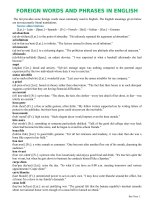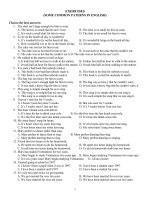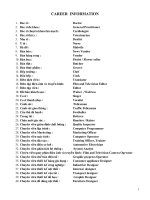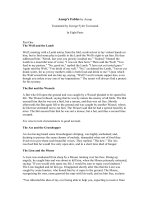Tenses in English
Bạn đang xem bản rút gọn của tài liệu. Xem và tải ngay bản đầy đủ của tài liệu tại đây (1.17 MB, 21 trang )
REVIEW OF TENSES IN ENGLISH
REVIEW OF TENSES IN ENGLISH
Nguyen Linh
Tranphu High School
•
a. Describes actions or situations that began in the past, are happening now and will
finish in the future.
•
Signal words:
•
now, at the moment, at this moment, at present, presently, today etc.
•
Example:
•
We are studying how to use 7 English verb tenses at the moment.
•
b. Describes actions or situations that are not exactly happening now but are
temporarily happening around now, not always or usually.
•
Signal words:
•
this week, this month, this year, summer, spring, etc.
•
Example:
•
He studies engineering but he is working as a part-time waiter for a restaurant this
summer vacation.
•
The Present Continuous Tense of the verbs like come, leave, arrive, return, and go
is often used to describe future actions which have already been planned. .
•
Signal words:
•
tomorrow, the day after tomorrow, next week / month / year, in + length of time.
•
Example: Our parents and sister are coming to see us tomorrow.
* The difference between present simple
and present continuous tense is that the
present simple describes long-lasting
actions (happen all the time) while present
continuous tense describe short-lasting
ones (in progress at or around now only).
Example:
We are Vietnamese so we speak
Vietnamese but now we are speaking
English to Mr. Bob because he doesn’t
know Vietnamese.
a. Describes actions or situations that finished or unfinished before now ( time
unknown).
Signal words:
up to now, up to present, by now, so far, not … yet, already, recently, lately,
ever, never, quantifier + times ( several / three / many times) etc.
Example:
I have already been to Hanoi but I have not seen Sword lake yet.
b. Describes actions or situations that began in the past and have continued up to
present.
Signal words:
for, since, during/in the last + length of time etc.
Example:
We have been studying / have studied at the International High School for 3
years.
We have been studying / have studied at the International High School since
2002.
Prices have increases / have been increasing during the last three months.
Nguyen Linh
* Note:
- The similarity between present perfect and
past simple is that both tenses describe
action in the past (happened before now)
but the difference is that past simple
mentions or implies an exact time of the
action whilm present perfect doesn’t.
- The present perfect continuous tense
describes actions or situations that began in
the past and have continued up to present
(Signal words: for, since). In many cases, it
can interchangeably be used with the
present perfect tense.
Describes actions or situations that happened at one
particular time in the past. It began and ended in the
past.
Signal words:
ago, clause of time in the past like “when I was
young, …), yesterday, at/on/in + point of time in
the past ( at the beginning of this semester; on
Jan 1st, 2000; in June, 2000), last
night/week/month/year/Saturday/June/
Christmas etc.
Example:
It rained yesterday;
I watched TV last night;
Our school was built 5 years ago.
Nguyen Linh
a. Describes an action or situation that was happening at a
particular time in the past.
Signal words: when, as, at + point of time etc.
Example:
At 8 last night, we were studying in our room.
b. Describes an action or situation that was happening when
another action occurred.
Signal words: when, as, while etc.
Example: She was taking a shower when the light went out.
c. Describes actions or situations in progress simultaneously.
Signal words:
while, when, as
Example:
I was doing my homework in my room when my roommates
were having a party in the other room.
a. Describes an action or situation that finished before
another past action.
Signal words:
when, before, after, by, as, up to then, by then, by that
time, not … yet, already, ever, never, quantifier + times
( several / three / many times) etc.
Example:
When we came, she was not there. She had already gone.
b. Describes an action or situation that finished before a
particular time in the past.
Signal words:
by, for, since, up to then, by then , not … yet, already, never,
quantifier + times ( several / three / many times) etc
By 10 last night, I had done 10 exercises on verb tenses.









